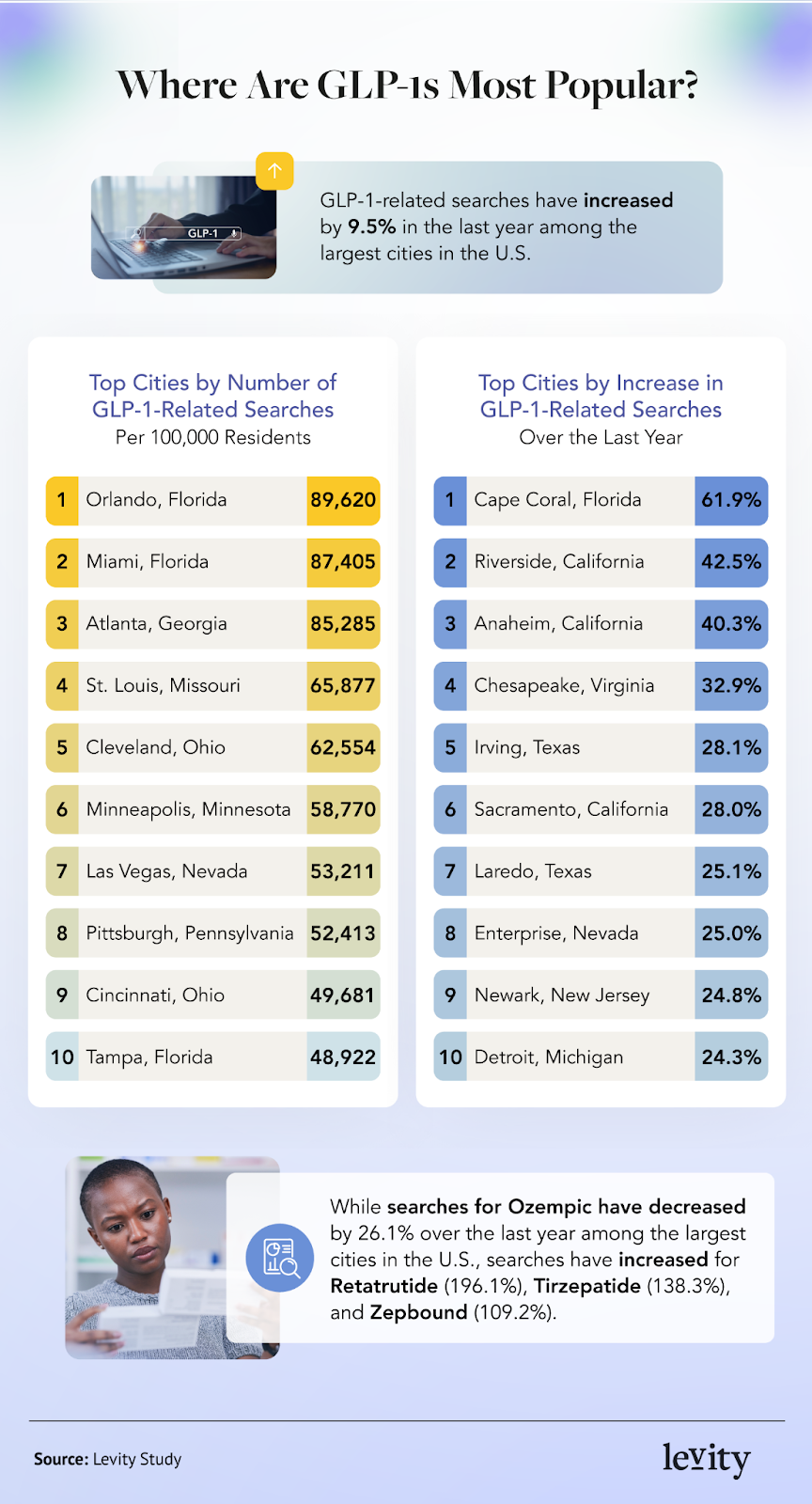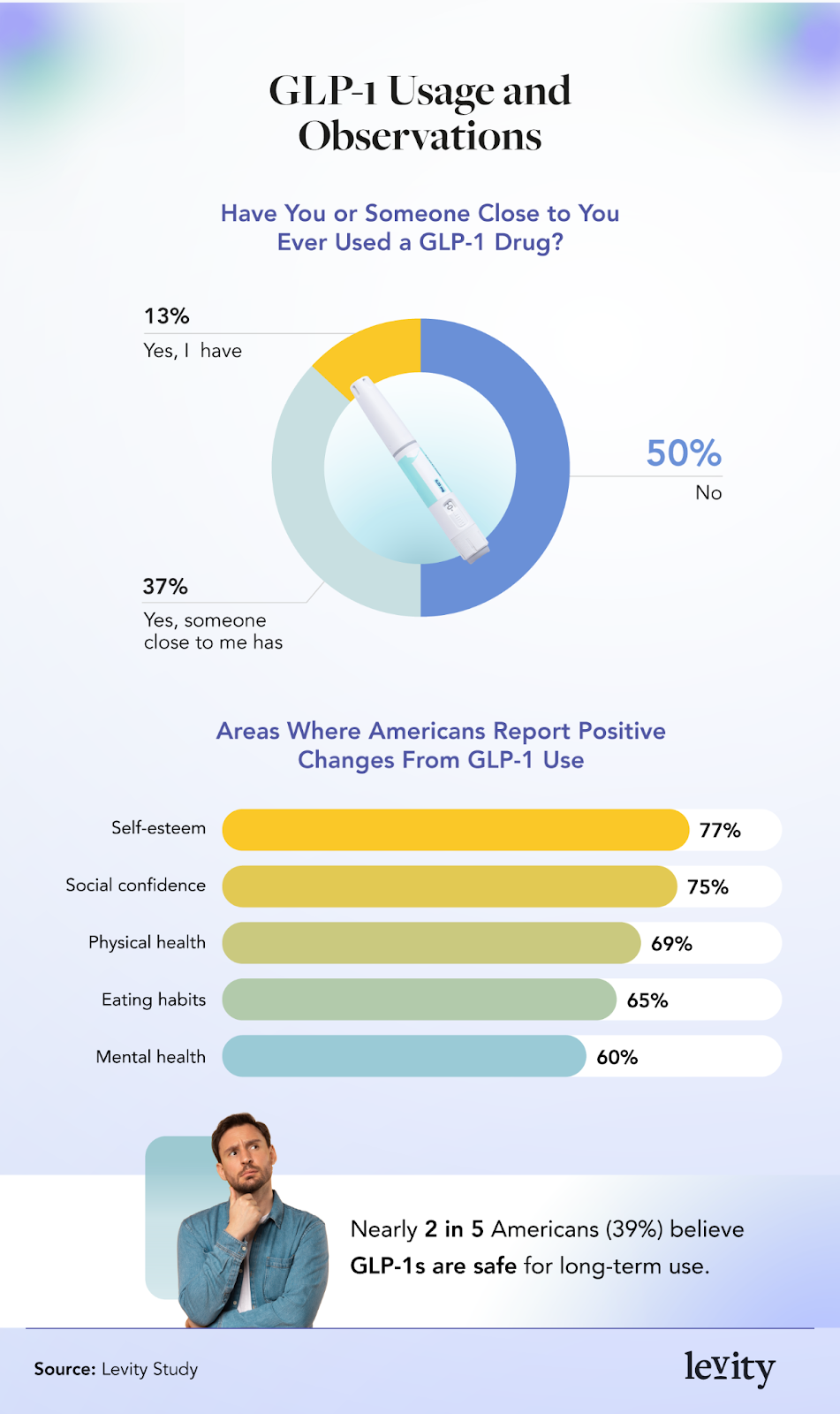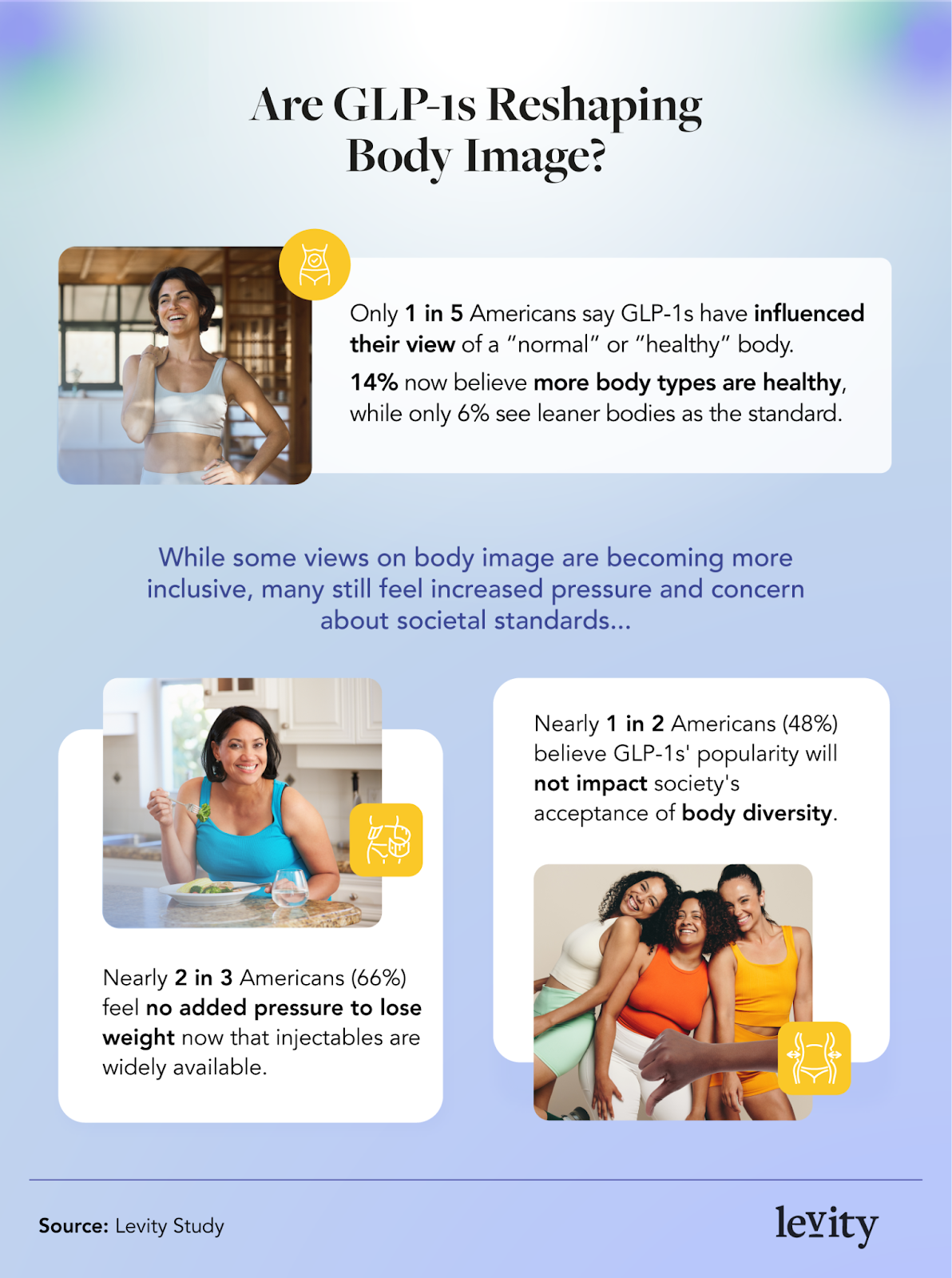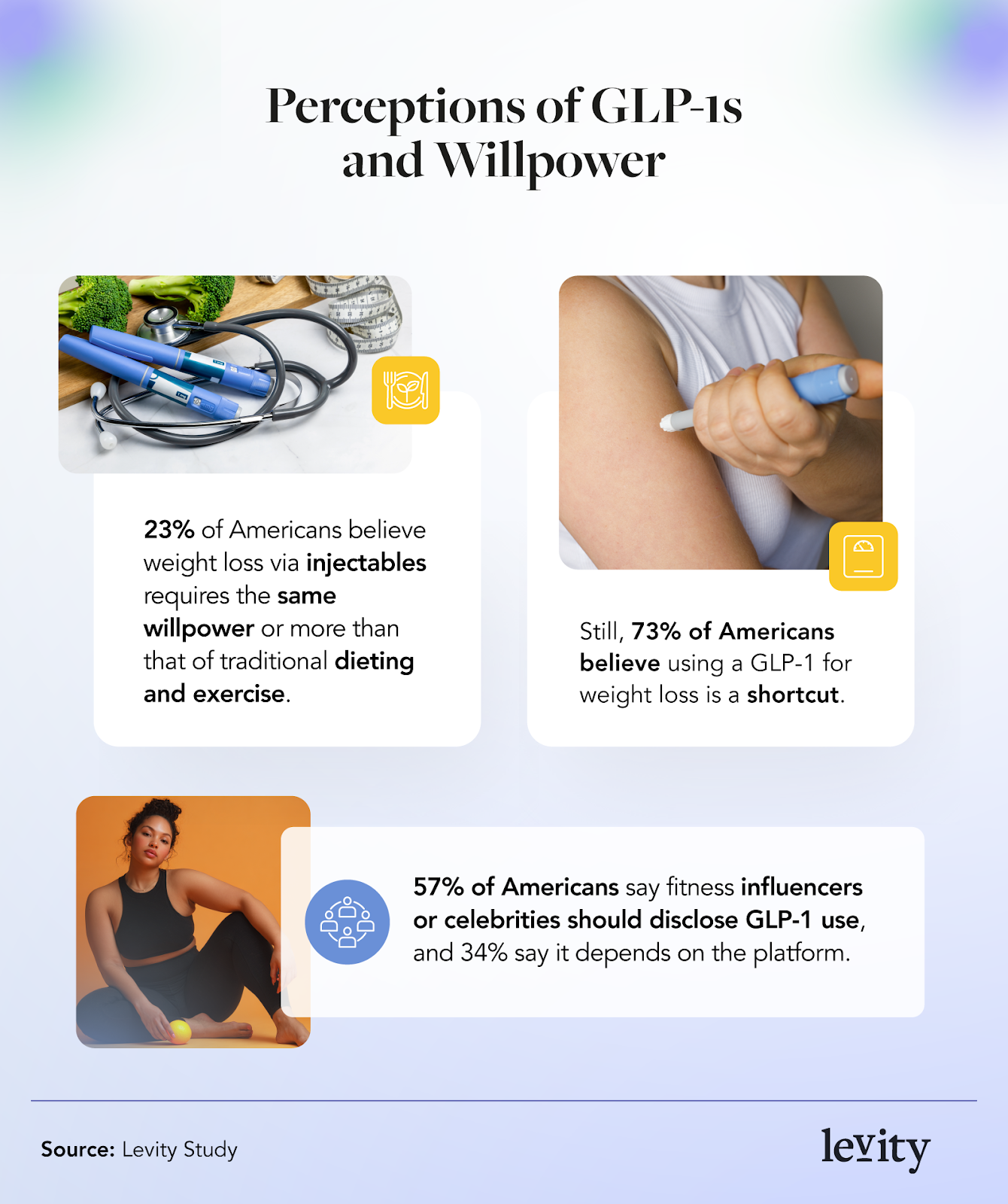GLP-1 Cost Calculator: Budget for Ozempic, Wegovy & Compounded Options
Plan your GLP-1 weight loss budget with Levity's calculator. Get a clear picture of what's affordable between brand-name and compounded choices.
Injectable weight loss medications like Ozempic, Wegovy, and Mounjaro have surged in popularity over the past year. But where is interest in GLP-1 medications highest, and how is this shaping public attitudes around health, fitness, and body image? To find out, we analyzed Google Search Trends across the 100 largest U.S. cities and conducted a national survey of over 1,000 Americans. The results reveal not just regional hotspots, but also how these medications are affecting self-esteem, cultural norms, and the conversation around what it means to live a healthy life.
Interest in GLP-1 medications has climbed across the U.S., but some cities stood out for their high levels of search activity and year-over-year growth.

Google search volume for GLP-1 drugs rose by 9.5% over the past year among the nation's 100 largest cities. Orlando, Miami, and Atlanta topped the list for the most GLP-1-related searches per 100,000 residents, indicating a high density of curiosity and likely demand.
Meanwhile, Cape Coral, Florida; Riverside, California; and Anaheim, California, saw the steepest increases in GLP-1 search interest, reflecting growing awareness or shifting medical priorities in these areas. These rising trends may be influenced by local health care access, demographics, or public conversations around weight loss.
Although search interest in Ozempic dropped 26.1%, searches for newer medications have soared: Retatrutide was up by 196.1%, Tirzepatide by 138.3%, and Zepbound by 109.2%. This shift suggests that consumers are staying informed and exploring emerging options in the GLP-1 space.
Usage and visibility of GLP-1s have been increasing, especially among younger generations.

Thirteen percent of survey respondents reported trying a GLP-1 medication, while 37% said someone close to them had. Gen Z respondents were most likely to have used a GLP-1 (17%), and millennials were most likely to know someone who had (41%).
Users and observers alike reported overwhelmingly positive experiences, citing improvements in self-esteem (77%), social confidence (75%), and physical health (69%). Many also noted better eating habits (65%) and improved mental health (60%), reinforcing the idea that GLP-1s may offer more than just weight loss.
Nearly 2 in 5 respondents (39%) expressed confidence in GLP-1s' long-term safety, highlighting a growing trust in these medications as more positive outcomes are shared.
The growth of GLP-1 usage also has Americans rethinking what health and attractiveness mean.

GLP-1s have reshaped how many people think about weight. While only 1 in 5 Americans said these medications have changed their view of what a healthy body looks like, for most, the changes were positive: 14% said they now see more body types as "healthy", while just 6% still viewed leanness as the standard.
Gender and age appeared to shape these perceptions. Gen Z respondents were most likely to maintain traditional ideals (12% still saw lean bodies as ideal), while women were most likely to embrace diverse body standards (16%), showing the differing impacts of social pressure on these groups.
Encouragingly, nearly two-thirds of Americans said they don't feel additional pressure to lose weight now that injectables are available. Yet Gen Z and women reported higher pressure rates — 40% and 43%, respectively — underscoring the ongoing need for supportive, inclusive health messaging.
Our respondents also thought critically about how these medications intersect with broader culture. Nearly half (48%) said GLP-1s won't affect society's acceptance of body diversity. Those who thought it would have a negative impact were mostly Gen Z (63%). This opens up space for continued conversations about body acceptance alongside new approaches to weight management.
Americans are divided on whether GLP-1s require willpower or merely offer a workaround.

Many Americans (73%) said GLP-1s are a shortcut to weight loss. This view may reflect concerns that the medications will bypass traditional habit-building practices such as diet and exercise (the reason cited by 60% of respondents), or that they are a temporary fix (52%).
However, many users challenged this notion. Forty-two percent of those who were currently using GLP-1s said losing weight on these medications requires the same willpower as traditional methods, and 15% said it takes even more. These perspectives highlight how personal health journeys vary, and that success looks different for everyone.
Attitudes also differed by generation. Millennials were the most inclined to view GLP-1s as a "shortcut" weight loss method (77%) while Gen X was the most likely to reject this idea (33%).
Transparency was a top priority. Most Americans (57%) believed influencers and celebrities should disclose their GLP-1 usage, and another 34% thought they should disclose it depending on the context — a sign that honesty in public health conversations is highly valued.
GLP-1 medications are reshaping not only how people lose weight but also how they think about health, effort, and self-worth. As the popularity of injectables grows, so do conversations about body image, social pressure, and the role of personal responsibility in weight management. These insights offer a crucial look at the cultural forces shaping the future of wellness in America.
For this study, we used Google Search Trends to determine GLP-1-related searches and increases in searches over the last year in the 100 most populous U.S. cities. Additionally, we surveyed 1,003 Americans about their thoughts and perceptions of GLP-1 usage, specifically the impact it has on users, how it reshapes body image, and whether it is considered a shortcut. Among respondents, 53% reported as Millennials, 26% reported as Gen X, 13% reported as Gen Z, and 8% reported as Baby Boomers.
Levity offers medically guided weight loss programs featuring GLP-1 treatments like Compounded Liraglutide with B12, Ozempic, Wegovy, and Mounjaro. Whether you're beginning your journey or managing side effects, Levity provides support, education, and expert care to help you achieve lasting results. Learn more about our treatment options for Wegovy, Ozempic, and GLP-1 medications, or explore Mounjaro through our personalized weight loss plans.
If you'd like to share or reference this study for noncommercial purposes, please include a link to this page and proper attribution to Levity.